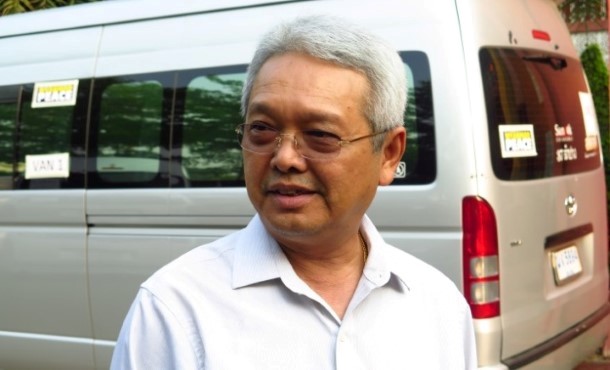Three ethnic armed groups—the Ta’ang Nationalities Liberation Army, Arakan Army and Kokang’s Myanmar National Democratic Alliance Army—currently involved in active conflict with the Burma Army in northern Shan State issued a statement on Thursday announcing their readiness to join the Union Peace Conference, scheduled to begin on August 31 in Naypyidaw.
However, a government peace negotiation team requested they announce their “willingness to end armed struggle” in order to participate in the peace talks. The government delegation had met the groups in Shan State’s Mongla region last week for a second time.
Khin Zaw Oo, a negotiator from the government’s peace team and a former lieutenant general, spoke with Irrawaddy senior reporter Nyein Nyein about the process.
Has the government invited all groups to attend the Union Peace Conference, including members of the United Nationalities Federal Council [UNFC]?
We will invite the seven members of the UNFC, and the Wa and Mongla groups—which have not signed the Nationwide Ceasefire Agreement [NCA]. But these other three groups must issue a statement including what we have asked for. If not, there is no way for us to talk with them yet.
Why can’t the government invite them, since the UNFC has been invited?
They are not the UNFC and it is different. They have been actively engaged with us since the fighting in Laogai [in northern Shan State, February 2015], where they undermined the sovereignty of the nation. We think differently of them.
A statement released after last week’s meeting said that it was a success. What has changed?
At that time, they said they would reply to us through an official channel. They should have contacted us officially. If their statement was as we discussed, there would have been a positive response; but if not, it would be negative. We do not want a response through a publicized statement. We want it to come through a negotiation channel.
What was your arrangement for further communication when you met with them?
When we met in the Mongla region, they replied to us via the Mongla leaders. Mongla was the medium. Now, the Mongla did not even know about this statement, when they should be the group contacting us and letting us know whether or not they agree with our previous discussions.
Will there be any further negotiations? How will you handle it?
Unless they contact us, we have no reason to contact them. Regarding how we will continue, we still need to talk to them. Even if they wish to join the Union Peace Conference, it is not the Taung Pyone festival [an annual Nat/spirit festival held at Mount Popa that all are allowed to join].
Will they be unable to join the peace conference until they pledge what you have asked?
Absolutely. If they want to build peace, they must. If not, there is no way for them to attend the conference.
As far as we know, Daw Aung San Suu Kyi plays the role of negotiator between the Burma Army and ethnic armed groups. You are a member of the group that she leads. Are you following her path as a negotiator? What is your approach to bringing both sides to the table?
The Burma Army and the government share the same view. When we hold talks, we take the views of both the army and the government. It is not that the army goes in direction A and the government goes in direction B. The publicized statement said that the groups would work for peace, but it did not address the issues that we brought up.
Is it quibbling over word choice?
It is not quibbling over a word. There is meaning behind the word. They said they would join the political dialogue, but did not say whether they would continue the armed struggle. They should express their desire to end the fighting in the near future.
If the three groups pledge what you demand—are they doing so to sign the NCA or just to join the Union Peace Conference?
It is different. We have not even considered the signing of the NCA yet. Talking about political negotiation does not equate to proving their commitment. We cannot talk recklessly about building peace. Talking alone does not bring anything, they must follow the path to the peace process.
If so, how much will the government agree to all-inclusion?
All-inclusion cannot happen all at once. But it will happen sooner or later.











